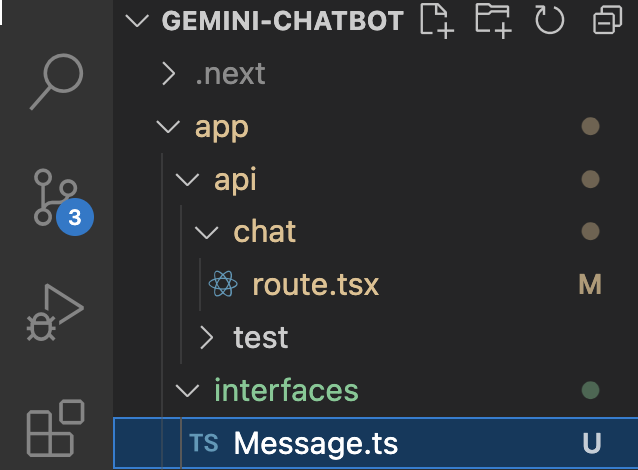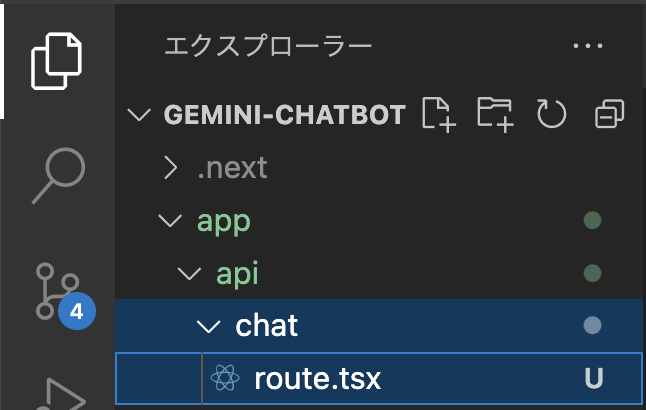 5.
Next.js でチャットボット - 2
5.
Next.js でチャットボット - 2
データモデル
データモデルとは
データモデルはデータ構造を定義し、データ管理するための概念です。データベース設計やシステム開発において、データの整合性や効率的なデータアクセスするために重要な設計です。モデルファイルを定義しておくことで、プログラムの効率化やバグを防ぎやすくなります。
TypeScriptの利用
TypeScriptには、データの形状を定義するために「インターフェース (interface)」と「型エイリアス (type)」があります。
Interface
interface User {
id: number;
name: string;
email: string;
isActive?: boolean; // optional property
}
const user: User = {
id: 1,
name: "John Doe",
email: "[email protected]"
};
Type
type User = {
id: number;
name: string;
email: string;
isActive?: boolean; // optional property
};
const user: User = {
id: 1,
name: "John Doe",
email: "[email protected]"
};
Roleファイル作成
メッセージの権限を設定する app/constants/roles.ts ファイルを作成します。このファイルは、role に対する表示ラベルとスタイルをまとめた設定です。
export const ROLE_USER = 'user' as const;
export const ROLE_BOT = 'bot' as const;
export type Role = typeof ROLE_USER | typeof ROLE_BOT;
export const roleConfig: Record<
Role,
{ label: string; bubbleClass: string; tagClass: string }
> = {
[ROLE_USER]: {
label: 'あなた',
bubbleClass: 'bg-blue-100 text-blue-800',
tagClass: 'bg-blue-600',
},
[ROLE_BOT]: {
label: 'Bot',
bubbleClass: 'bg-gray-100 text-gray-800',
tagClass: 'bg-gray-600',
},
};
インターフェイス
Message インターフェイス app/interfaces/Message.ts を作成します。

インターフェイス定義
roles をインポートし、content, role を定義します。
app/interface/Message.ts
import type { Role } from '@/app/constants/roles';
export interface Message {
content: string;
role?: Role;
}
- 「content」は string型
- 「role」は「user」「bot」の2種類の Role型
バックエンドAPI作成
Next.jsをバックエンドとして、POSTリクエストに対応したAPIを作成します。
仕様
| 項目 | エンドポイント | HTTPメソッド | JSON |
|---|---|---|---|
| チャット送受信 | /api/chat/ | POST | { message: Message} |
- Next.js APIサーバに、メッセージをPOSTリクエスト
- Gemini APIにメッセージをリクエスト
- Gemini APIのレスポンスデータ取得
- Next.js APIサーバがデータをレスポンス
ファイル構成
./
├── app/
│ ├── api/
│ │ └── chat/
│ │ └── route.ts
│ ├── interfaces/Message.ts
│ ├── constants/role.ts
Next.js API作成
ファイル作成
ルーティングファイル app/api/chat/route.ts を作成します。

POSTリクエスト
POSTリクエストAPIを作成します。
app/api/chat/route.ts
import { NextRequest } from 'next/server';
export async function POST(req: NextRequest) {
}
POSTデータの message を非同期取得し、コンソール表示します。
app/api/chat/route.ts
import { NextRequest } from 'next/server';
export async function POST(req: NextRequest) {
// POSTデータ取得
const message = await req.json();
if (!message) return NextResponse.json({ error: "Not found message" });
console.log('Received message:', message);
}
レスポンス
固定のボットメッセージをレスポンスします。
app/api/chat/route.ts
import { NextRequest, NextResponse } from 'next/server';
import { ROLE_BOT } from '@/app/constants/roles';
export async function POST(req: NextRequest) {
const message = await req.json();
if (!message) return NextResponse.json({ error: "Not found message" });
console.log('Received message:', message);
const botMessage = "Botのメッセージ";
return NextResponse.json({ content: botMessage, role: ROLE_BOT });
}